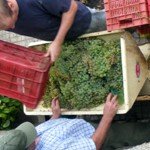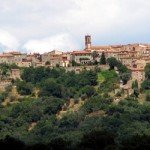Globalization is changing Italy, like any other country. Large chains are opening up stores in the cities which are open 12 hours a day or more. But in smaller centres like my home village, there are no chain stores: most shops are family businesses. One family runs one store. Sometimes three generations work side by side, almost always parents and children. Shops are handed down from generation to generation. Family members come to help at the busiest times of the year.
Many times, the guests of our own family business (Casina di Rosa, our vacation rental in Tuscany) have asked me why everything has to shut down between 12.30 and 4.30 in Italy. Is it possible that shops cannot stay open all day in this country and people still have to take a nap after lunch in the third millenium?!
We had to explain that nobody in the first world works 12 hours a day… people work shifts in chain stores. But in small family-run businesses, many shop owners are the sole people in charge of their own activity and they need a break at some point to have lunch and to rest. If they keep their shops open from 8/8:30 am to 12/12:30 pm and then from 3/3:30 pm to 7/7:30 pm, they are still working their full 8 hours a day. So, what most people call “the siesta” (which is actually a Spanish thing…) is in fact necessity.
Up until a few years ago, the opening hours of shops were strictly regulated. Every shop had to have two closing days a week (one was necessarily Sunday) and to conform to specific opening hours, which included a break of a couple of hours minimum. Now every activity can choose their hours of operation but most family-run businesses still follow the traditional hours.
Italians do not seem to place much value in the possibility to shop 24/7. They seem to be more attached to the idea of having time to be home in time to have lunch with the family, to pick up kids from school, to have time to live their own lives at home. For this reason, every attempt to import the 24/7 model of large chains or the choice to keep shops open on Sunday still receives harsh criticism from the unions and it’s often the subject of legal battles.
In our village, as in the neighbouring villages, all the shops are family-owned. The shops are called by their owner’s name. So you go to Daniela’s if you want to get groceries, to Lorella’s for flowers, to Nadia’s if you need lingerie, to Mauro’s for the newspaper, to Letizia’s or Serena’s if you want a hairdresser, to Dante’s for the bar, to Wilma and Alberto’s if you want bread and to Alessandro’s or Sandro and Tatiana’s if you want to have a great meal out. Even the walk-in clinic and the pharmacy are known by the name of the doctor and the pharmacists!
My family owned and ran the butcher’s shops for a long time. On my dad’s side of the family, they were (and still are) either butchers or farmers. My dad was the first to leave the business and move into a different career path, just to go back to the land after he retired.
On my mum’s side of the family, most were either carpenters or seamstresses, but those professions are long gone (although there still is a great restorer of antique furniture, who, of course, is known by the name of Biagio’s even though the business’s name is La Medievale).
My grandmother is still doing little tailoring jobs for the family (hems, adjustments to clothes, etc.). We still have the original door and windows that my granddad and great-grandfather made back in the 40’s at Casina di Rosa.

And we consider it our family business. In the most literal sense. The house was built by my great-grandparents and has never left the family. My mum and uncle were born there. That is a property that hopefully we will never have to part with. We love welcoming people from around the world there, because in doing so, we can keep it alive. And in return, the house allows people to experience life in a little hilltop town in the heart of rural Tuscany. We are very proud of the way we have chosen to keep our family home alive.
It is also our way to contribute to keeping our village alive. We try to use local services and products most of the time. We shop in the village for all the items we need for the house, so that our family business can help other family businesses survive in this increasingly globalized world.
In Italy, family ties are still a fundamental value, they truly matter (both in a good and in a bad way). And family businesses are just another expression of the importance we place in our family and in our tradition, and should be sheltered as much as possible from the storms brought about by the changing economy, before it changes the face of the country.
(If you are looking for a nice alternative to a busy impersonal hotel, come stay at our vacation house in Southern Tuscany, Casina di Rosa!)
Italy Blogging Roundtable
This is a post in a monthly series called The Italy Blogging Roundtable. Here you can find the posts of the other bloggers who participate in the roundtable. Our topic this month was “family business“:

- Italy Explained – It’s a family affair
- ArtTrav – taking a break this month
- Brigolante – Anything But Second Best: Foligno’s Pasticceria Muzzi
- Italofile – taking a break this month
- Driving like a maniac – taking a break this month















So fascinating!